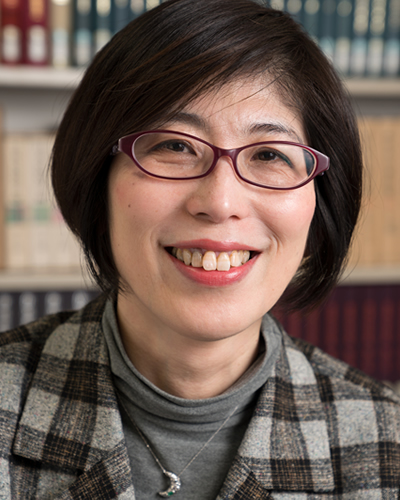The fundamental feature of the "Edo-Tokyo Studies" advocated in the 1980s was not in dividing Edo and Tokyo into two, but in looking at them joined together. The term "Edo-Tokyo" was used in order to narrow in on the essence of the city that cannot be grasped through research methods that separate eras by equating Edo with pre-modern, and Tokyo with modern. Many scholars flocked to the scene of Edo-Tokyo studies, opening up interdisciplinary urban scholarship and new regional research. Vital among those scholars were Hosei University President Tanaka Yuko, who advanced research in Edo literature and culture from international and novel perspectives. Also, Hosei University Professor Jinnai Hidenobu, who developed a new urban theory by reevaluating Italian cities, as well as Tokyo, from the viewpoint of water city.

Second Director of the Research Center for Edo-Tokyo Studies
Yokoyama Yasuko
Looking back today, we notice that elements mostly unconsidered during the era of Edo-Tokyo Studies have become large issues with the changing of the times. For example, the issue of the environment. Of course, even in the 1980s, themes were researched such as Edo-Tokyo's nature and urban environment. Since then, however, environmental issues have gradually intensified, and the Great East Japan Earthquake occurred. Facing these realities there is need to conduct research of Edo-Tokyo from the viewpoint of sustainability. Also, from the past, people with different languages and cultures have gathered in Edo-Tokyo, and recently, in particular, there has been acknowledgement of cultural diversity. With worsening global environmental issues and increasing globalization, we in the present day must surely be conscious of the issue of the environment and internationalization.
The Hosei University Laboratory of Regional Design with Ecology, having amassed research in urban environmental issues, and the Hosei University Research Center for International Japanese Studies, having progressed in Japanese cultural research from an international standpoint, combine within the Research Center for Edo-Tokyo Studies to further Edo-Tokyo research with a consciousness of today's issues. We hope to provide opportunity for exchange with scholars and students from overseas, utilize the university's asset as point of contact with the world, and examine the characteristics of Tokyo as international city from diverse perspectives.
The new Research Center for Edo-Tokyo Studies has four research projects. "Edo-Tokyo" brings with it an image of research directed towards history or the past. Here we have designed our research activities to consider the current state of Tokyo, and Tokyo's near future, based on history. With our research focus the megalopolis of Edo-Tokyo, we must consider issues in parallel discussion with scholars in different fields from outside the university. On this occasion I am passed the baton of Center Director from Professor Jinnai Hidenobu. I too was once a student who was captured by Edo-Tokyo Studies. Without forgetting that beginner's feeling, I shall take on the resolution of our first Center Director, "To aim towards a research organization open to region, society, and the world."
I look forward very much to everyone's understanding, cooperation and participation.